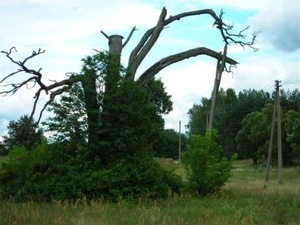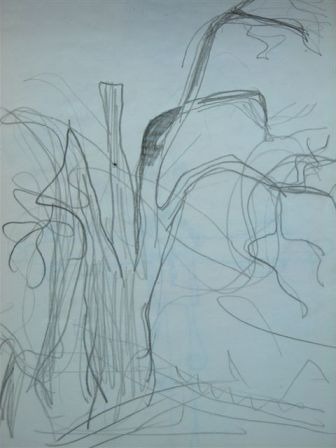IN MEMORIAM OF A.VAITKŪNAS. SUMMER OF 0
Aušra Barzdukaitė-Vaitkūnienė
www.kamane.lt, 2007 09 07
Summer of 1993. Motif – Margioniai pine.
A.Vaitkūnas. Summer of 1993. Sketch of Margioniai pine.
The summer of 1993 was the hottest in Lithuania. It seems to me so.
We married in Kaunas Arch-Cathedral while a horrid wind was storming in Lithuania on January 14.
We did not have our home and lived in Arūnas mother’s house. Arūnas had a workshop in Daukša street and I had a 20-year-old Žiguli car. We were free.
I found an announcement in Kauno Diena before the summer that a local artist invited painters to a plein air in Perloja.
We both with Arūnas loved wandering. We formed the canvases, bought paints, packed everything on the roof of Žiguli and set off. (…) However, nobody opened the door in Perloja and we understood that there would be no plein air.
Without saying anything, Arūnas took up the wheel. I asked where we were going, and he smiled mysteriously. He loved making such surprises.
It was hot, the country roads looked white and dusty, the Lithuanian frontier was not far already. We turned to an old village. The graveyard appeared first, then – an old monumental pine in the middle of the village. Napoleon soldiers prayed at it once. The village was famous for its barn theatre.
Arūnas was acquainted with a village actress Marytė, the performer of main roles. He visited the village in 1986 when art practice was organised with his pupils. (…) A key from an old cottage was in the hand of Arūnas soon.
The cottage was impressive – it looked like a snail crawling down the hill. There was no furniture inside but for the bench. We laid our sleeping bags on the floor and woke up every morning having slid down to the windows.
The environment looked so archaic, everything seemed new and unseen to me here. Arūnas did not seem a newcomer.
The lines of the landscape and colours were miraculous. I wanted to paint at once, while Arūnas questioned:
“Well, what’s for dinner? Boiled potatoes would be tasty.”
I hated peeling off potatoes, but this was marital life. (…) We decided with Arūnas to paint at six o’clock in the morning and to hide in the cottage during the midday heat. We will be able to work in the evening again.
Thus the rhythm of work was settled. Arūnas found a good motif – a cobweb of branches and fallen yellow apples. Later this motif will be repeated with variations in his works.
(…) Arūnas is a perfect traveller, a real pilgrim. He oriented well in forests and locations.
“Now, we need to make a break in painting, let’s go to Kapiniškės village,” he announced.
The heat was over +30. I covered the head with a scarf, Arūnas took a notebook for painting as always, and we set off directly across the meadows and fields.
So many interesting things in every step! A strange form of a shadow, unseen relations of colours, blooming briers, wonderful smell and their pink colour - far from banal. We discussed every noticed thing moving to discussions on painting and old masters. Arūnas painted some items in his notebook while I memorised everything.
A large red blooming shrub met us before Kapiniškės village as if we were entering a land of tales. Arūnas said: “It is a sign. Make a wish and it will be fulfilled.”
(…) We returned to our cottage late in the evening. We dreamed that omelette would be good for breakfast.
A bag with fresh eggs was placed near the door in the morning. Everything fulfilled what we wished for.
We spent our days painting and travelling.
However, everything may happen even in a fairy-tale. Radiculatis started for Arūnas. He felt ache and could not move. I went to a local shop to buy some vodka for compresses. Vodka with a glimmering blue label, from Byelorussia evidently. I brought it and rubbed the small of the back carefully. I folded the back of Arūnas in a sheep fur which we had on the seat of the car.
Radiculitis passed after several days. I took off the fur and the small of the back of Arūnas remained overgrown with sheep wool. We laughed heartily, and then Arūnas said in a more serious manner: “It is a sign that we need to return to Kaunas”.


